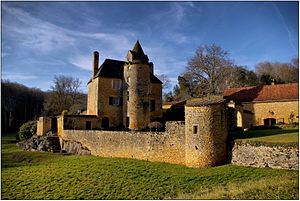Proissans
|
Proissans Pruissans |
||
|---|---|---|
|
|
||
| region | Nouvelle-Aquitaine | |
| Department | Dordogne | |
| Arrondissement | Sarlat-la-Canéda | |
| Canton | Sarlat-la-Canéda | |
| Community association | Sarlat-Black Perigord | |
| Coordinates | 44 ° 56 ′ N , 1 ° 15 ′ E | |
| height | 118-314 m | |
| surface | 17.56 km 2 | |
| Residents | 1,022 (January 1, 2017) | |
| Population density | 58 inhabitants / km 2 | |
| Post Code | 24200 | |
| INSEE code | 24341 | |
| Website | Proissans | |
 Proissans - Manoir du Cluzeau |
||
Proissans ( Occitan Pruissans ) is one of a main village and several hamlets (hamlets) existing and farmsteads municipality with 1022 inhabitants (as of January 1 2017) in the southeast of the southern French departments of Dordogne in the region Nouvelle-Aquitaine in the old cultural landscape of the Périgord .
location
The place Proissans is a good six kilometers (driving distance) northeast of the city of Sarlat-la-Canéda or about 65 kilometers southeast of Périgueux at an altitude of about 185 m above sea level. d. M. The climate is temperate and is influenced equally by the Atlantic and the mountains of the Massif Central ; Rain falls throughout the year.
Population development
| year | 1800 | 1851 | 1901 | 1954 | 1999 | 2014 |
| Residents | 965 | 1,019 | 868 | 537 | 761 | 987 |
The continuous population decline since the second half of the 19th century is mainly due to the phylloxera crisis in viticulture and the increasing mechanization of agriculture as well as the associated loss of jobs. The recent increase is essentially related to the tourist development in the region.
economy
For centuries, the residents of the community lived on the produce of their fields and gardens, self-sufficient ; In addition, cattle breeding, a little viticulture and the planting of chestnuts and nut trees were carried out. Craftsmen, small traders and service providers settled in the village. Since the 1960s, some of the vacant houses have been used as holiday apartments ( gîtes ) . The forestry plays an important role in the economic life of the community.
history
The first written mention of the place name Proissanxs comes from the year 1365. It is unclear whether the place was affected during the Hundred Years' War (1337–1453) or during the Huguenot Wars (1562–1598).
Attractions
- The single-nave parish church of Saint-Blaise was rebuilt in the 19th century on the foundations of a previous medieval building. Only the apse is Romanesque .
- Most of the houses in the town have a small stone coat of arms above the entrance; however, these are from more recent times.
Surroundings
- The 15th / 16th Château de La Roussie , built in the 19th century, is located about two kilometers south of the town ( 44 ° 55 ′ 14 ″ N , 1 ° 15 ′ 10 ″ E ). It is privately owned but was classified as a Monument historique in 1946 .
- The Manoir de Langlade was built in the 15th century and is located about three kilometers east of the village near the hamlet of Langlade ; it was classified as a Monument historique in 1948 .
- The Manoir du Cluzeau, which was built around the same time, is about three kilometers north of the village ( 44 ° 57 ′ 0 ″ N , 1 ° 14 ′ 12 ″ E ). It is also privately owned and was classified as a Monument historique in 1970 . In the immediate vicinity is a pigeon house (pigeonnier) .
Personalities
- Pierre Thibaud (1929–2004), trumpeter and music teacher
Web links
- Proissans, church - photo + brief information (French)
- Proissans, history and sights - photos + brief information (French)
Individual evidence
- ↑ Proissans - Map with altitude information
- ↑ Sarlat-la-Canéda / Proissans - climate tables
- ↑ Château de la Roussie, Proissans in the Base Mérimée of the French Ministry of Culture (French)
- ↑ Manoir de Langlade, Proissans in the Base Mérimée of the French Ministry of Culture (French)
- ↑ Manoir du Cluzeau, Proissans in the Base Mérimée of the French Ministry of Culture (French)

